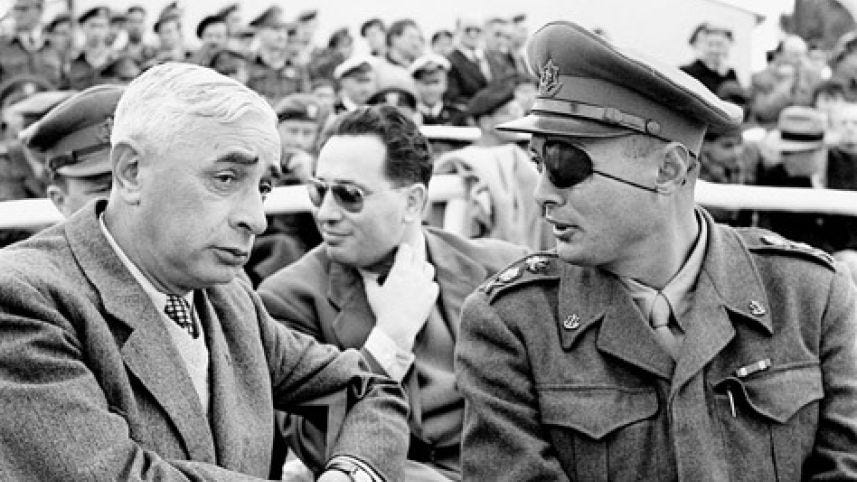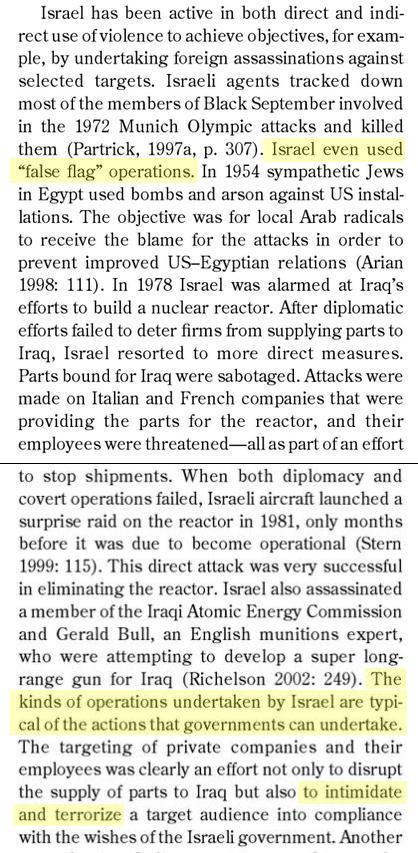Israel's Long History as a Rogue Terrorist Nation: Part 2
The Lavon Affair aka “Operation Susannah” aka "relax, we're Zionists, we're allowed to terrorize civilians!"

As we’ve seen with the climate change, COVID and mRNA gene therapy frauds, whenever you dare suggest a globalist campaign is being carried out for nefarious purposes, you will promptly be labelled a “conspiracy theorist,” “denier,” and “extremist.” If you dare mention terms like “psy-op” and “false flag event,” you can time your watch by the subsequent arrival of tired old “tinfoil hat” cliches.
Those who discuss the Lavon Affair cannot even begin to be shunted into any of the aforementioned categories. Even Wikipedia, which never misses an opportunity to deride contrarian thinkers as “conspiracy theorists,” refers to it as an “Israeli false flag operation.”
Because it was.
The Lavon Affair was a textbook classic case of Zionist malfeasance, but I’m guessing most of you reading this have never heard of it. Zionists and their sycophants don’t like discussing the Lavon Affair, because it doesn’t support the reigning “antisemitism” narrative they’re so fond of shoving down our throats.

Before we discuss what went down in the summer of 1954, a little context is required. Bear with me, because it’s key to understanding the background of the Lavon false flag operation.
From Perry 2016:
“From 1945 onwards, the US government focused on a campaign of security and stability in the Middle East. This strategy revolved around the protection of the region’s oil reserves and the prevention of Soviet influence in the area. However, in carrying out this strategy, the Truman and Eisenhower administrations also authorized illegal coups, regime overthrows, and secret military and intelligence operations. While some of these actions resulted in short-term gains for Washington, the long-term effects of these actions have been catastrophic for populations in the Middle East and have given credence to the belief that the United States is simply a violent, imperial power. Developments like the creation of the state of Israel in 1948, and US support for it, the CIA led coup in Syria in 1949, the overthrow of the democratically elected Iranian Prime Minister Mohammad Moseddegh in 1953, US officials’ continued quest to secure the region’s oil fields, and the US government’s support to colonial powers like the British all helped create the perception that the United States was simply a new imperial power. In the 1940s and 1950s, anti-colonial groups in the Middle East were greatly affected by these developments.” (Bold emphasis added).
So, we’ve got Uncle Sam meddling in the resource-rich Middle East and supporting the Zionist expropriation of Palestine, and we have local Arabic organizations in the area becoming increasingly miffed at what is transpiring.
Uncle Sam also longed for control over the area’s vast oil reserves, and hence did not support British imperialism. However, US officials considered British troops in the Middle East, particularly around Egypt’s Suez Canal, a vital resource in the protection of the region.
So Uncle Sam had to perform a delicate juggling act, trying to appease everyone involved while maneuvering to fulfill his own geopolitical interests.
The British had imposed martial law on Egypt in December 1921. In February 1922, the British declared Egyptian independence; a constitutional monarchy was created but the British continued to pull the strings from behind the scenes.
Of course, the Egyptian King, Farouk I, and various opposition groups wanted total control of the country, free from British influence.
As no-one remotely familiar with the history of the Middle East would be surprised to learn, conflict between these various groups and the Egyptian state over the next few decades led to numerous episodes of violent and often deadly conflict.
Fast forward to the early 1950s, by which time both the British and Americans had concluded that “unhindered access and absolute control” of the Suez Canal was key to thwarting a potential Soviet invasion of the West.
In 1951, the US and Britain, with the support of France and Turkey, devised a plan that called for the creation of a Middle East Command (MEC). In the MEC proposal, the Suez Canal base would ostensibly be turned over to the control of the Egyptians, but under the auspices of MEC, would clearly be under British and Western command.
To say the Egyptians rejected the proposal would be an understatement. Not only did the Egyptian Prime Minister and Parliament reject the MEC proposal out of hand, they promptly tore up the 1936 Anglo-Egyptian treaty. This, and perception of the West’s duplicitous tactics, fanned the flames of Egyptian nationalism. Large numbers of Egyptians took to the streets, leading to violent and deadly clashes with British soldiers.
In July 1952, a group of young Egyptian military officers – with support of the Egyptian military and tacit approval from other leading Egyptian nationalist political parties and organizations – forced King Farouk into exile, and a few months later dissolved the Egyptian parliament. By December 1952, Egypt was firmly in the hands of the Revolutionary Command Council (RCC), with Gamal Abd al-Nasir as its guiding force and the popular General Naguib as its figurehead.
In late September 1952, Naguib informed the US Ambassador in Egypt that the RCC was prepared – if the US was willing to supply a small amount of military aid to secure the RCC’s position in Egypt – to give Washington secret assurances concerning Egypt’s future involvement in an MEC-style arrangement, now being referred to as the Middle East Defense Organization (MEDO).
In 1953, Eisenhower came to power, and took over the job of convincing the now-reluctant British to go along with the plan.
Despite repeated attempts, Eisenhower and Churchill could not come to agreement. However, by early 1954 Churchill began to accept that retaining the Suez Canal Base was "a lost cause" and that Britain could not afford to keep its bloated force in the region. His decision was also heavily influenced by the successful American test in early March 1954 of a hydrogen bomb 1,000 times more powerful than the atomic bombs dropped on Japan in 1945. Faced with the possibility of having 80,000 troops vaporized should war break out, Churchill informed his cabinet the following month “our strategic needs in the Middle East had been radically changed by the development of thermo-nuclear weapons … Our withdrawal from Egypt could be presented as part of a redeployment of our forces in the Middle East based on a re-assessment of our essential strategic needs in the area.”
London agreed to hand over control of the Suez Canal base to the Egyptians and a full withdrawal of British military personnel from Egyptian soil. Any British technical advisors that remained would have to be contracted through a civilian organization. The base, however, would be open to the West if Egypt, any other member of the Arab League, or Turkey was in imminent danger of being attacked.
So what does all this have to do with Israel and its decision to conduct a false flag event in 1954?
Everything.
Israel was watching the Anglo-Egyptian drama unfold, and was not at all keen on the specter of true Egyptian independence. Many Egyptians, including the army faction that had overthrown King Farouk, were still angry over Egypt’s humiliating defeat by Israel in the 1948 war.
Fearing the imminent wrath of a truly independent Egypt, Israel needed a way to convince the Americans and Brits to stick around.
When verbal coaxing failed to achieve its desires, the Israeli military settled on a terror campaign - “Operation Susannah” - as its preferred mode of persuasion.
Thankfully, the operation turned out to be a total screw-up. Sadly, the only lesson the Israelis learned was to be more meticulous in their future terror outings.
Israel Goes Rogue. Again.
Former IDF Military Intelligence chief Binyamin Gibli, who died in 2008, is believed to have initiated Operation Suzannah. Nine Egyptian-Jewish undercover agents, members of Unit 131, were instructed to bomb British and American targets in Egypt in an effort to reverse Britain's decision to withdraw from the Suez Canal.
It was hoped the attacks would turn the US and Britain against Nasser and destroy the plan for Egyptian nationalization of the Suez canal.
The operation commenced on July 2, 1954, with the detonation of bombs at a post office in Alexandria, followed by the July 14 bombing of the US Information Agency libraries in Alexandria and Cairo and a British-owned theater.
The bombs were detonated after hours, and no casualties occurred during the explosions.
The Plot Comes Unstuck
Israeli agent Avri Elad was sent to lay the groundwork for the campaign. His past accomplishments included discovering methods used by wanted Nazi war criminals to escape to Arab countries, and being a common thief who had not only been punished for looting Arab homes during Israel’s War of Independence, but had also stolen money from Shimon Peres’ wallet.
With a guy like this involved, what could possibly go wrong?
Elad informed Egyptian intelligence about the imminent attacks. Based upon his information, Egyptian agents followed an Israeli operative, Philip Nathanson, to his next intended target at the Rio Theatre. Nathanson was arrested after his bomb prematurely ignited in his pocket.
When the Egyptians searched Nathanson’s apartment, they found the names of the entire cell and arrested all of them.
Compounding the Israel military’s woes was that none of the participants had been prepared by their handlers for the possibility of capture.
Elad and another key participant, Avraham Dar, managed to escape. Two others, Max Binett and Yosef Carmon, killed themselves (the former when being arrested, the latter in prison).
After their trial in Cairo, two operatives, Moshe Marzouk and Shmuel Azar were condemned to death by hanging. Two others were acquitted, while the remaining eight received lengthy prison terms.
The lone female operative, Marcelle Ninio, was sentenced to 15 years in prison. She was released in 1968, when she and other Israeli agents were exchanged for Egyptian prisoners taken during the Six-Day War between Israel and Egypt in 1967.
The Fallout
After the Cairo trial in which the bombers were sentenced, Israel launched a retaliatory incursion into Gaza that killed 39 Egyptians.
The false flag bombings having failed, in 1956 Israel launched an attack along with Britain and France on Egypt, known as the Suez War. Again, the mission was to subvert Egyptian nationalization of the Suez Canal, this time by toppling Nassar.
Like the bombing psy-op, it didn’t go well.
Not only did the UN and US force the invaders to withdraw, but soon after Israel invaded, an enraged Egypt expelled 25,000 Egyptian Jews, forcing them to sign away their property before kicking them out of the country.
In the wake of that failed invasion, France expanded and accelerated its ongoing nuclear cooperation with Israel, which eventually enabled the Jewish state to build nuclear weapons.
Embarrassed before the West, Israel long denied involvement in the Lavon Affair, even after its 1979 peace deal with Egypt.
The operation ultimately became known as the "Lavon Affair" after the Israeli defense minister Pinhas Lavon, who was forced to resign as a consequence of the incident.
Prime minister Moshe Sharrett, not believed to have known about the operation, ordered a commission of inquiry made up of a Supreme Court justice and the IDF's first chief of General Staff, Yaakov Dori, which produced inconclusive results.
Lavon wound up resigning from office, but the scandal continued to rage, tearing apart the ruling Mapai Party, the predecessor of today's Labor Party.
David Ben-Gurion, who returned to the Prime Minister's Office after Sharrett's resignation in 1955, ordered a new committee of inquiry that found Lavon did not approve Operation Suzannah.
Ben-Gurion, who believed Lavon was responsible, quit his post as defense minister in protest.
The Lavon-Ben Gurion split divided Mapai, with the party's Left siding with Lavon, and the rightist stream backing Ben-Gurion and Peres.
Despite all this, Israel publicly denied any involvement in the incident until 2005, when the surviving agents were awarded … wait for this … “certificates of appreciation” by Israeli President Moshe Katsav.
"Although it is still a sensitive situation, we decided now to express our respect for these heroes," Katsav said after presenting the three surviving members of the bomber ring with the certificates at a Jerusalem ceremony.
Still to come: Israel’s bombing of the USS Liberty, the Israeli Defence Force’s support of Hamas, and its highly suspicious failure to respond to a tip-off about the October 7 massacre - not to mention its slow response once the carnage commenced. Oh, and a reminder as to just who it was that launched a mass-poisoning mRNA campaign on Jewish Israel (clue: It wasn’t Arabs nor the Soros “River to the Sea!” rent-a-crowd, nor was it neo-Nazi wankers from Huntington Beach).







It's such repugnant subject matter about such a loathsome and contemptible horde of characters, and yet your reporting on it all is entertaining as it is edifying. Thank you.
This is a nice overview Anthony thank you. In the middle of all these messy ops, there are also dog and pony shows and just purposely making things messy to keep the heat on the ME for what was to come in 2024. Importantly, there are no nuclear weapons-because flash nuke explosions are not possible, those are a narrative for public consumption and to steal $ from the treasury. No nuke enlightenment takes a number of hours of reading to really get. Esp the link to Akio Nakatani in here: https://protonmagic.substack.com/p/spooks-with-nukes which also has a photo of ground zero at Hiroshima which makes it obvious it was Napalm bombing.